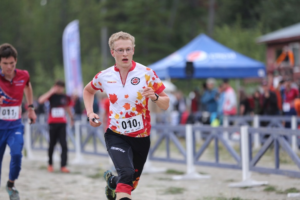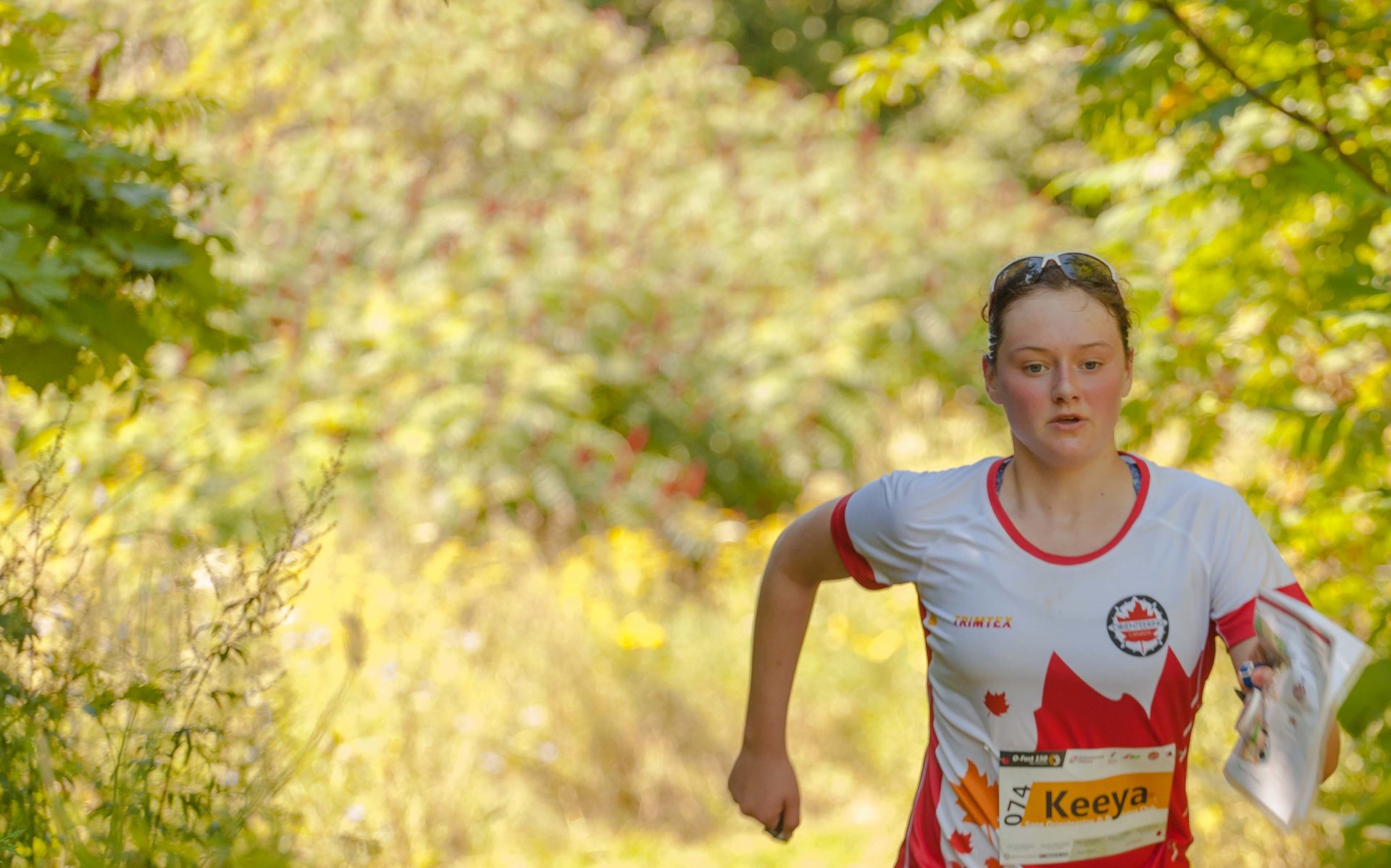
David Bakker may be a relative newcomer to the BC orienteering scene, but he has already had a very big impact. David somehow manages to combine a demanding academic program with physical and mental training, production of high-quality O maps, organization of excellent competitions and other service both within his club (SAGE) and on the provincial Board of Directors (OBC) – truly a Renaissance Man!
We caught up with David just as he was heading to the Yukon for a summer of O mapping…
DW: How long have you been orienteering and how did you get started?
DB: I have been orienteering since 2014, when my family traveled to Kamloops (from our hometown of Salmon Arm, about 1.5 hours away) for a Sage Orienteering Club event. We knew that a few of our cross-country skiing friends (including the Woods and the Mays) participated in orienteering, and that was our exposure point. That summer I went to the Sass Peepre Junior Camp in Whistler BC as Orienteering BC was offering to cover the registration costs, and I was one of, if not the most inexperienced orienteer there. I then did the WCOCs right after the camp, and thoroughly enjoyed it. I have been hooked ever since!
DW: Aside from orienteering and x-c skiing, what other sports do you enjoy?
DB: I enjoy playing some recreational league soccer, some mountain biking, and hiking.
DW: How do you stay fit for orienteering?
DB: I have not done a great job of staying fit over the school year (I am a full time Biochemistry student), and no longer consider myself an elite orienteer or particularly well trained. That said, I enjoy a lot of the above sports and also do a lot of mapping over the summer which provides a baseline level of fitness throughout the summer months, but I lack both the speed training and the necessary year-round training for elite competition.
DW: You have played several different roles in the BC orienteering scene – which has been the most satisfying for you?
DB: I have filled most of the roles in BC orienteering now, athlete, organizer, mapper, and board member. While I have had moments of frustration in each of them, I have found all of them to be rewarding experiences in their own way. I think the most satisfying is probably as an athlete when you
run that “almost” perfect race, but the most rewarding is the event organization. When participants of all ages and abilities come back to the download station from a course you set having overcome just the right amount of difficulty out on course that it was both achievable and satisfying, that is very rewarding as a volunteer.
DW: When you explain to a new acquaintance what orienteering is, and why you love it, how do you describe it to them?
DB: It really depends on who I am talking to, and whether they would be more interested in the recreational or competitive aspects of the sport. My go to explanation for people who I expect are more interested in the competitive aspect is that it is a mix between a cross country running race and a scavenger hunt which forces you to use both all of your brain power and physical strength at the same time. For people who would be more interested in the recreational aspects, it is an amazing chance to visit places that you would otherwise never go to (both around the world and in your backyard) while at the same time getting exercise and overcoming brain puzzles.
DW: In the world of orienteering, who have you found to be the most inspiring person, and why?
DB: Thierry Gueorgiou. He is one of, if not the best orienteer ever, with incredible results spanning more than a decade at the top of the sport. Shortly after I started orienteering, he started logging his training on Attackpoint, including all of his training and competition maps. I learned so much by reading through his training log, for example see a typical week here: http://www.attackpoint.org/viewlog.jsp/user_15725/period-7/enddate-2016-10-23
DW: Do you have a pre-race routine that prepares you for a successful competition?
DB: Not really. Normally, my fitness is insufficient for what others would call “a good warm-up”, so I tend to keep it short (around 10-15 minutes including any walk to the start) with a mix of jogging and dynamic exercises. I do not do a particularly good job of the mental warm up, but I always try and yawn in the last start box to wake myself up a bit and also to not treat things too seriously. I do not think there is a one size fits all warm up, and you should experiment with what works for you.
DW: Which race has been the most memorable (good or bad) for you thus far?
DB: My most memorable race is probably the BCOC 2014 middle in Invermere at the Lillian Lake map. I was the only BC competitor in my category, and so assumed that I had a guaranteed medal, all I had to do was get all the controls – I did not! This was my first (of many!) mispunches. Similarly, in 2018 at the COC long in Whitehorse, I ran in men’s elite, and had an excellent run, but forgot to punch two of the water controls that I visited. Lesson learned the hard way: always punch first, drink second!
DW: Which map or terrain is your favourite?
DB: I think the sheer variety of terrains is what makes orienteering so special. That said, I tend to really enjoy highly technical maps with lots of subtle negative topography and open forest. There are some excellent sections of map on Sabiston Creek (above Kamloops), another ‘not-so-secret’ area under development right now on the high elevation plateau above Kelowna, and some excellent maps around Whitehorse (like the “Fun Zone” on Croucher Creek).
DW: Which is your preferred O discipline – urban sprint, forest classic or rogaine – and why?
DB: Again, it is the sheer variety in orienteering that makes this sport so unique and exciting. I love being able to do an urban sprint one day, and a long distance in the middle of nowhere the next. Unfortunately, there have not been very many rogaines in BC recently, so I have not been able to do as much rogaining as I would like. I do think of rogaining as a fairly separate sport, though, with far more in common with ultra-running and adventure racing than with orienteering.
DW: If you could work/study anywhere in the world for 2-3 years, what would be your top three choices, and why?
DB: I have yet to find anywhere better than BC (except possibly the Yukon), and I think our provincial slogan of “The Best Place on Earth” is true. That said, I would enjoy working or studying in one of the Scandinavian countries for a year or so just to experience being able to go to an orienteering event every day of the week, but I would not want to spend 2-3 years overseas. I would prefer if BC was able to get to a point where orienteering is widespread across the province, so that I could orienteer all the time here 🙂
DW: What is the best advice you could give to an aspiring junior orienteer, to help them succeed?
DB: Make sure that you do a wide variety of activities (both sporting and otherwise), not just orienteering. I think most sports right now are focusing too intently on sport specialization at far too young of an age, and it is to the detriment of both the sports themselves and the development of junior athletes. Participating in a wide variety of sports is a great way to minimize any potential overuse injuries, helps to keep things fun, and has a better chance of keeping kids in sports.
DW: If you were an all-powerful being, what is the one thing you would change in the Canadian orienteering scene?
DB: I think we have far too much of an obsession with all the little intricacies of everything, and it is creating a huge drain on volunteer time. I think Adrian’s Barebones orienteering is an excellent model that we should pursue as much as possible, so that we can free up more time and money for things like promotion, junior program development, and beginner instruction. We need to stop focusing on the minutiae of rules for event hosting, and start looking at how to best grow the sport to a more sustainable size.
One of my attempted contributions to this goal of keeping things simple and growing the sport was working on the Okanagan Adventure Running Tournament (OART) in Kelowna and Vernon the past two years. We had seven short sprint races throughout the weekend, but kept it very manageable from an organization perspective. We only offered one course per race, which everyone participated on, re-used some maps for multiple different events, and skipped most of the event extras (like a banquet, awards, age categories, etc.). Most people are interested in having a fun course in an interesting place, with all the controls in the right place. Everything after that does not really matter too much.
 Orienteering BC
Orienteering BC